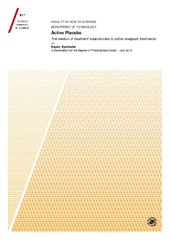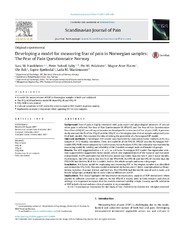Blar i forfatter "Bjørkedal, Espen"
-
Active Placebo - The relation of treatment expectancies to active analgesic treatments
Bjørkedal, Espen (Doctoral thesis; Doktorgradsavhandling, 2016-11-25)The placebo analgesic effect refers to the improvement in a group receiving an inert treatment compared to a group receiving no treatment. Conversely, nocebo hyperalgesia refers to the worsening in a group receiving an inert treatment compared to a no treatment control group. The hypothesis that active treatments, e.g. a drug, enhance the placebo effect has received some support but rarely been ... -
Developing a model for measuring fear of pain in Norwegian samples: The Fear of Pain Questionnaire Norway
Vambheim, Sara Magelssen; Lyby, Peter Solvoll; Aslaksen, Per M; Flaten, Magne; Åsli, Ole; Bjørkedal, Espen; Martinussen, Laila Marianne (Journal article; Tidsskriftartikkel; Peer reviewed, 2017-10-01)<p><i>Background - </i>Fear of pain is highly correlated with pain report and physiological measures of arousal when pain is inflicted. The Fear of Pain Questionnaire III (FPQ-III) and The Fear of Pain Questionnaire Short Form (FPQ-SF) are self-report inventories developed for assessment of fear of pain (FOP). A previous study assessed the fit of the FPQ-III and the FPQ-SF in a Norwegian non-clinical ... -
Evidence for Cognitive Placebo and Nocebo Effects in Healthy Individuals
Turi, Z; Bjørkedal, Espen; Gunkel, Luisa; Antal, Andrea; Paulus, Walter; Mittner, Matthias (Journal article; Tidsskriftartikkel; Peer reviewed, 2018-11-28)Inactive interventions can have significant effects on cognitive performance. Understanding the generation of these cognitive placebo/nocebo effects is crucial for evaluating the cognitive impacts of interventional methods, such as non-invasive brain stimulation (NIBS). We report both cognitive placebo and nocebo effects on reward-based learning performance induced using an active sham NIBS protocol, ... -
Expectations of increased and decreased pain explain the effect of conditioned pain modulation in females
Bjørkedal, Espen; Flaten, Magne Arve (Journal article; Tidsskriftartikkel; Peer reviewed, 2012)Chronic pain is believed to be related to a dysfunction of descending pain modulatory mechanisms. Functioning of descending pain modulation can be assessed by various methods, including conditioned pain modulation (CPM). CPM refers to the inhibition of one source of pain by a second noxious stimulus, termed the conditioning stimulus. This procedure can activate an endogenous pain inhibitory mechanism ... -
Failure to Find a Conditioned Placebo Analgesic Response
Flaten, Magne; Bjørkedal, Espen; Lyby, Peter Solvoll; Figenschau, Yngve Anton; Aslaksen, Per M (Journal article; Tidsskriftartikkel; Peer reviewed, 2018-07-30)<p><i>Background</i>: Associative learning has, in several studies, been modulated by the sex of the participant. Consistent with this, a recent review found that conditioned nocebo effects are stronger in females than in males.</p> <p><i>Purpose</i>: It has been suggested that conditioned placebo responses are stronger in females, and this hypothesis was investigated in the present study. Cortisol ... -
Impact of active placebo controls on estimated drug effects in randomised trials: a systematic review of trials with both active placebo and standard placebo
Laursen, David RT; Nejstgaard, Camilla Hansen; Bjørkedal, Espen; Dreyer Frost, Anders; Rix Hansen, Morten; Paludan-Müller, Asger S; Prosenz, Julian; Werner, Christoph Patrick; Hrjóbjartsson, Asbjørn (Journal article; Tidsskriftartikkel; Peer reviewed, 2023-03-06)Background - An estimated 60% of pharmacological randomised trials use placebo control interventions to blind (i.e. mask) participants. However, standard placebos do not control for perceptible non‐therapeutic effects (i.e. side effects) of the experimental drug, which may unblind participants. Trials rarely use active placebo controls, which contain pharmacological compounds designed to mimic the ... -
Interaction between expectancies and drug effects : an experimental investigation of placebo analgesia with caffeine as an active placebo
Bjørkedal, Espen; Flaten, Magne Arve (Journal article; Tidsskriftartikkel; Peer reviewed, 2011)In a randomised placebo-controlled clinical trial it is assumed that psychosocial effects of the treatment, regression to the mean and spontaneous remission are identical in the drug and placebo group. Consequently, any difference between the groups can be ascribed to the pharmacological effects. Previous studies suggest that side effects of drugs can enhance expectancies of treatment effects in the ...


 English
English norsk
norsk





